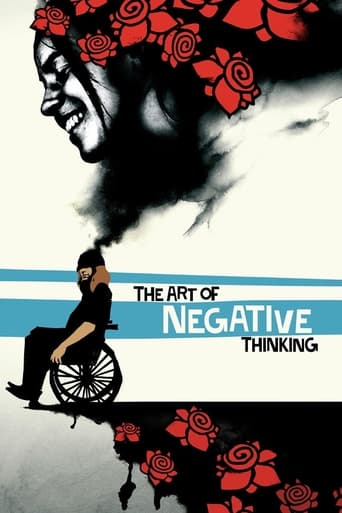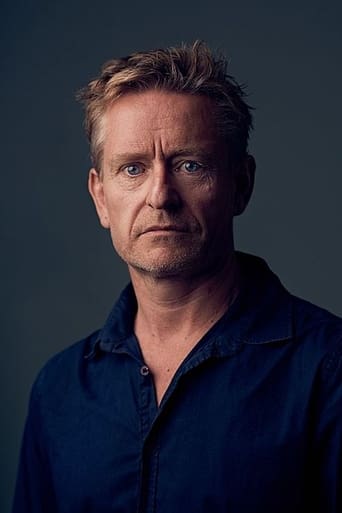

The Art of Negative Thinking (2006)
The local disability support group visits an involuntary member, not realizing that it will bring them to a critical mass.
Watch Trailer
Cast
Similar titles




Reviews
Simply A Masterpiece
Pretty Good
After playing with our expectations, this turns out to be a very different sort of film.
By the time the dramatic fireworks start popping off, each one feels earned.
And not afraid to pull any punches! If you like your comedies dark, than this one will be a movie you should look out for. It is anything but political correct. It is borderline many times and has a few flaws, but it is funny as can be.Again only if you can wrap your mind around the crazy plot and the sometimes degrading humour. The actors do a fantastic job, it's shot a bit like a documentary and the music is really great. It's nicely edited and has a strong "strangely" positively feeling about it. I just loved the movie and I'm happy to have caught it on the Fantasy Filmfest in Stuttgart.
Very few movies are made about disabled people. It seems to be a taboo area that few filmmakers are willing to venture into, as they do not want to make a tearjerker propaganda film that manipulates people's feelings or appear to be too insensitive about the issue. This film does neither; instead, through realistic characters, it takes the honest approach and allows the audiences to examine the characters and understand how they feel without the filmmakers help. Thus, it makes the film enticing and provocative.The film examines the different degrees and dimensions of both physical and emotional disability and how it affects those around them. It shows how some people are down on themselves and refuse to improve or become worst than they are. It shows how those disabled can increase pressure and frustration on those closest to them, and vice-versa, how those closest to them can cause them pain and suffering, even if they had the best of intentions. Finally, it shows that acceptance, both the disabled and those around them, is a process. It takes time and patience; if one does not have the patience, it is better off if that person leaves.One thing to take away from this film, as it offers a great lesson: there must be a balance between positive and negative thinking. Being too positive and smiling all the time might not be such a good tactic in life. Just look at Marte. She tries to be positive in order to protect her partner's feelings; instead, he feels very guilty and does not appreciate her efforts. However, at the same time, being too negative will only sent one into depression, as Lillemor demonstrates. She is rather healthy, but because she is so down on herself, she thinks she is no better than the disabled people she associates with. Therefore, in the end, one must be both positive and negative. This way, a person would be able to examine the reality of the situation and have the courage to move forward.8/10
Breien's film about handicapped people is a corrective. It mocks programs that offer false cheer, repress the need to express anger, and don't give people who need to do so the right to take things in their own hands.Things get lively as soon as Tori (Kjersti Holmen),a smug therapist who works for the Norwegian state health system, takes her group of variously dysfunctional folks in a van to the house of Geirr (Fridtjov Såheim), a wheelchair bound man who's refused to join the program. If she thinks she's going to win Geirr over, she's got another think coming. As we see before the group arrives, Geirr, who's paraplegic and impotent from a car accident, doesn't get along with his wife Ingvild (Kirsti Eline Torhaug) and likes to spend his time getting high, drinking beer, listening to Johnny Cash albums and watching war movies.Tori has brought quite a motley crew. There's Lillemor (Kari Simonsen), a middle aged divorced woman in a neck brace. Marta (Marian Saastad Ottesen) is a pretty woman. She is paraplegic too, from a mountaineering accident. Gard (Henrik Mestad) is her self-righteous, self-pitying boyfriend. Asbjorn (Per Schaaning) is an older man who is seriously damaged by a stroke and can hardly speak. Tori imposes a regime of forced cheer. It's obviously gone too far with Marta, who wears a fixed rictus smile. Lillemor is perpetually whining. She gets to voice her complaints into the knitted "shit bag," which Tori passes to people who want to say something uncheerful.Ingvild has invited the group over because she can't take Geirr's withdrawn grumpiness much longer and is desperately hoping they can get through to him. The surprise is that it's he who gets through to them. Geirr doesn't want anybody to try to tell him that things are okay for him. By shaking up the group and expelling Tori and encouraging the others to admit what's really going on inside or alternately dropping their facades of self-pity, Geirr releases a swoosh of energy in the group that flows back to him. It turns out he's a pretty together fellow. He becomes the leader--and the exponent of The Art of Negative Thinking. The group helps him by pointing out that of all of them, he's materially the best off. He lives in a big, beautiful house, while some of them are struggling to survive financially. Others also reveal what else is going on with them, that Tori's bossiness had kept from coming out. Marta stops smiling long enough to point out to Gard that his failing to tie her off is why she fell. On the other hand he needs to stop agonizing over that and move forward. Lillimor doesn't really need the neck brace. Asbjorn gets so involved in the proceedings, which involve some useful drunken revels, that he regains some of his power of speech. In time Tori is allowed back to apologize and the air has been cleared.The solutions the group, with Geirr, arrive at relate to 12-step recovery, which assumes as a given that people must help themselves and you don't know what it's like unless you've been there yourself. Nobody who hasn't dealt with the minute to minute hardships of being disabled has the right to tell handicapped people to keep their chin up. You have to acknowledge the dark side to get to the light. When being honest is the prime requisite it also comes clear who has been faking and who can get a lot better fast if they try.But this isn't some kind of instructional film. It's a somewhat theatrical happening, whose improvisational surprises at times suggest the work of Lars von Trier. The actors manage to seem real and at the same time somewhat stylized.This is a nice little film that somehow seems ideally a product of the angst-ridden world of the Scandinavian northland. But a lot of what goes on here is universal, and by no means restricted to the handicapped--or to Norwegians.Seen as part of the San Francisco International Film Festival 2008.
I recently saw this at the 2008 Palm Springs International Film Festival and of the 38 films I saw there this year, the Art of Negative Thinking has emerged as my film favorite. Fist of all, this is a small film shot in 20 days with little obvious budget. Almost the entire film is filmed on location in a house and besides the cast, the most expensive overhead was probably the rights to use Johnny Cash and some other great 60's 70's music and some snippets of a few movies. This is a dark comedy and the comedy is very, very funny and it's usually unexpected and right around the corner throughout the film. What makes this film all the more amazing is it is the debut feature film from it's writer/director Bård Breien both as a writer and as a director. Geirr (Fridtjov Såheim) is a paraplegic whose once idyllic life of matrimonial bliss to Ingvild (Kirsti Eline Torhaug) has been shattered by his paralysis. Ingvild wants to stay with him but Geirr has withdrawn from her and the world and spends his days watching 1970's Vietnam themed films on TV and listening to Johnny Cash records while he gets drunk and smokes pot, living on pizza, wearing an Army jacket and a silly cap and harboring an unhealthy fascination with handguns. Tori (Kjersti Holmen) is a national health psychologist who is the head of a state run positivity group program for victims of paralysis. Ingvild has contracted Tori to try to enroll Geirr in her program and since Gierr is naturally resistant to the idea, Tori takes her group to him. Marte (Marian Saastad Otteson) is a quadriplegic who is Tori's star pupil in positive thinking. Gard (Henrik Mestad) is Marte's boyfriend who has joined the group in support of Marte. Asbjørn (Per Schaaning) is a once successful businessman who as the result of stress and alcoholism suffered a debilitating stroke. Lillemar wears a neck brace for sympathy but is a bitter 65 year old divorcée. This is a great ensemble cast with each a memorable character. This is one of those films that makes me laugh days and weeks after seeing it. I would give this a 10 out of 10 and highly recommend it.








